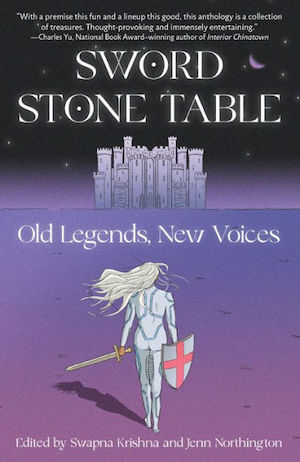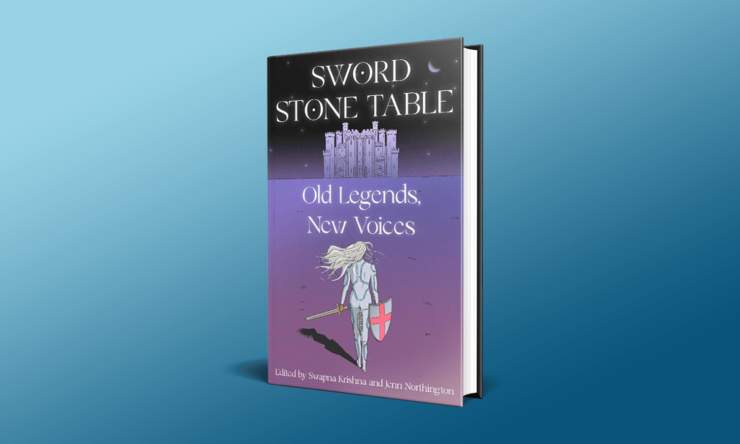Sword Stone Table is a new anthology of original fiction inspired by Arthurian myth. Edited by Swapna Krishna and Jenn Northington, it expands and explores one of the most familiar mythic cycles in Western fantasy, with a particular focus on gathering new perspectives.
Sword Stone Table is an anthology with a lot to say. It is an ambitious, thematically-sound anthology, with a robust central thesis. The Round Table, it posits, is universal. The traditional stories are simply one version of an infinity of retellings: the archetypes, tropes, and narratives at the heart of Arthurian legend are universal. The anthology sets out not to ‘enlarge’ the Table, but to show a multiplicity of Tables: Round Tables that include the voices and experiences of marginalised groups, throughout space, time, and realities.
Many of the stories within look at the transcendence of the Arthurian cycle by transposing it directly, therefore demonstrating the eternal flexibility of the myth. To me, the strongest stories take a step further, looking at the myth as myth, and toying with perspective and agency. These stories examine the role—necessary, forlorn, beautiful or dangerous—that myth plays in our lives.
The anthology is split into three parts—sensibly enough—Once [Past], Present, and Future. The opening section is, perhaps, the strongest.
The first stand-out is Ausma Zehanat Khan’s opening story, “The Once and Future Qadi”, does an impeccable job of presenting the anthology’s thesis. A detective story, of sorts, it follows the wise Qadi Yusuf, as he’s invited from Al-Andalus (Moorish Spain) to Arthur’s court, to investigate, and hopefully put to bed, the rumours of Guinevere’s infidelity. As a concept, the story is impeccable. It builds beautifully on familiar Arthurian lore, but also, charmingly, humbles it—putting legendary Camelot into context as a parochial backwater.
Buy the Book


Sword Stone Table
The second story, Roshani Chokshi’s “Passing Fair and Young”, is the anthology’s finest. Again starting with the familiar, Chokshi explores the story of Lancelot through the eyes of Elaine, daughter of the Fisher King and Lancelot’s “other” love. Chokshi’s story is about perspective: what does legend look like from the inside, from the eyes of the ‘unexceptional’? But it is just as much about agency—Elaine here is someone with a choice between heroics and happiness, legend and life, and chooses (or so she thinks) between them. There’s an additional layer to the story. Because Chokshi has so beautifully given voice to a character that ‘chooses’ to be forgotten, Elaine is given, in many ways, what she had sacrificed. This is one of the year’s finest stories, for many reasons, on many levels.
The Present section focuses more on direct translation of the Arthurian myths. “Black Diamond” sees the story of Arthur playing out through baseball; “Flat White” takes place in a coffee shop (a now-classic trope of transformative works). “Mayday” is a sprawling novelette—of the type that only Maria Dahvana Headley could ever write—that elegantly transposes Arthurian epics into a multi-generational melodrama set in, of all things, the politics of 19th century populism.
The Future is the briefest section, with only three stories. Silvia Moreno-Garcia’s “A Shadow in Amber” is deliberately, peripherally Arthurian. A reclusive future aristocrat indulges herself on the downloaded memories of “Lancelot”, a thrill-seeking young man. Our protagonist is nameless, past-less—she has all the wealth and power in the world, but is trapped in a bored and meaningless existence. “Shadow” speaks to the way that we relate to myth—hungrily, desperately, vicariously, but always from the outside. While Sword Stone Table posits, as a whole, that we—all of us—need myths, “Shadow” touches on the darker side of the way we ‘consume’ content.
Sword Stone Table struck me as a labour of love—a carefully-assembled ‘Round Table’ of eclectic creative talents all writing on one of fantasy’s most established tropes. This is a thematic anthology that doesn’t simply concatenate random stories, but has a lot to say as a text in its own right. Although the editors’ voice comes out in the stories they’ve assembled, I would’ve enjoyed a longer introduction (a rare ask!), with Krishna and Northington writing about the challenge they set themselves—and how they met it.
My one criticism is to be taken more as a plea for a sequel. This excellent anthology deftly proves its thesis: Arthur is indeed, universal. But Arthur is not only universal, it is quintessentially British. There are many stories here that examine the myth’s place in the world, and several that look at the myth’s place as a story, but there are none that look at what the idea of Camelot meant—and still means—to Britain. Arthur is, for better and for worse, the closest we get to a ‘national myth’ and origin story. The perspective of previously marginalised and excluded voices on that particular facet of Arthurian myth would be powerful and fascinating, now more than ever.
Sword Stone Table: Old Legends, New Voices is published by Vintage Books.
Read an excerpt from Ausma Zehanat Khan’s story “The Once and Future Qadi” here.
Jared Shurin is the editor of The Djinn Falls in Love, The Outcast Hours, The Best of British Fantasy, and many other published and/or forthcoming works. He writes irregularly at raptorvelocity.com and continuously at @straycarnivore.










